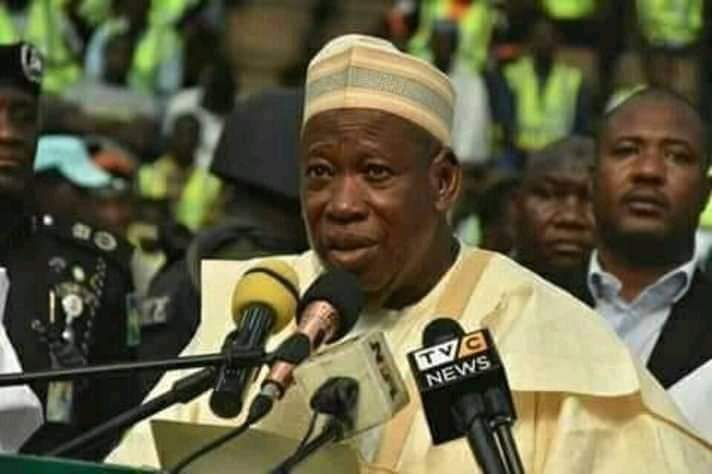Justice A.T. Badamasi of a Kano High Court on Wednesday adjourned the case between the National Coordinator of Lawyers for Sustainable Democracy in Nigeria, Bar. Mohammed Zubair and Kano state House of Assembly, Hon. Baffa Babba Dan Agundi and the state Attorney-General to December 6 for judgment.
Bar. Zubair had dragged the defendants to court seeking for an Order of Interlocutory injunction to stop Kano state House of Assembly and its agents from investigating the alleged $5 million kick-backs involving Kano state Governor, Dr. Abdullahi Umar Ganduje.
When the case came up for hearing, Counsel to the plaintiff, Bar. Nuraini Jimoh, argued that Kano state House of Assembly has no powers to investigate the criminal allegations against Governor Ganduje.
According to him, the state House of Assembly only has the powers to make laws, establishing an anti-graft agency which, by law, can investigate such matter.
In his submission, the state Attorney-General, Ibrahim Muktar, who is also the Third Defendant to the case aligned himself with the position of the Counsel to the plaintiff.
According to him, “by virtue of my office, my own is to follow the law. I have perused the application, I stand with the plaintiff and I adopt all the processes by the plaintiff, including his argument.”
The Attorney-General also urged the Court to disregard the counter affidavit filed by the First and Second defendants, arguing that, “it is not safe for the Court to rely on the entire affidavit,” because the identity of the witness was not disclosed.
Citing section 115 of the Evidence Act (2011), he insisted that the affidavit lacked credibility.
The Attorney-General further stated that, “coming back to the main issue whether the state House of Assembly has the powers to investigate criminal allegations, no power under section 128 (1) is given to the House of Assembly to investigate the case.”
According to him, “section 128 (2) of the constitution gave the House of Assembly the powers to expose corruption, and not the powers to engage in criminal investigation which was being conducted by the House of Assembly.”
He cited Exhibit one of the case (letter of invitation by the Assembly to the Governor) where the phrase “bribery allegation” was used, insisting that “bribery” can only be attributed to a crime.
According to him, section 128 (1) of the constitution gave the House of Assembly the powers to make laws establishing anti-corruption agencies, and not the powers to investigate criminal cases.
He insisted that, “it was a criminal trial or investigation that was being conducted by the House of Assembly. This is wrong because it is the statutory responsibility of the police to investigate crime.
“Members of the state House of Assembly are not experts in criminal investigation. They are not trained investigators. I submit that the House of Assembly has no capacity, whatsoever, to conduct criminal investigation because section 36 (5) and section 208 of the constitution gave the police the powers to investigate crime. So, section 128 of the constitution should not be in isolation on the issue before the Court.”
He argued further that the proceedings by the House Investigative Committee was not a fact-finding exercise as claimed by the defendants, but a criminal investigation, adding that, “in the interest of justice law says that House of Assembly has no right to conduct criminal investigation.
“The Kano state House of Assembly or any other state Assembly, including the National Assembly has no powers to engage in investigation of criminal allegation because it will lead to injustice against the person accused.”
He urged the Court to grant the applications filed by the plaintiff in the interest of justice.
In his argument, Counsel to the defendants, Barr. Mohammed Waziri told the Court that the Kano state House of Assembly Investigative Panel engaged in a fact-finding mission, and not investigation of criminal allegation.
According to him, “I want to emphasize that there is no doubt that what the State House of Assembly is investigating is allegations of crime against the Governor, by doing so, they are exercising their power to expose crime—it is now for the judge to differentiate between crime and corruption.”







